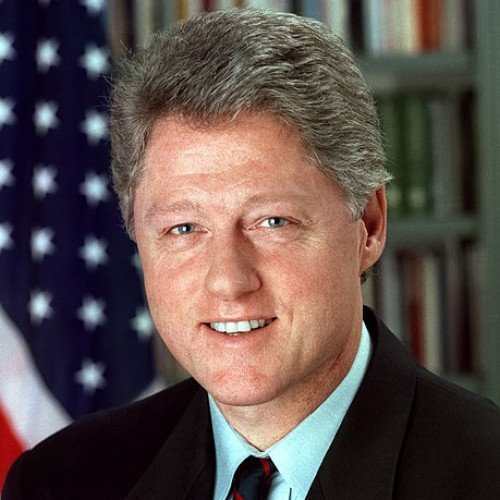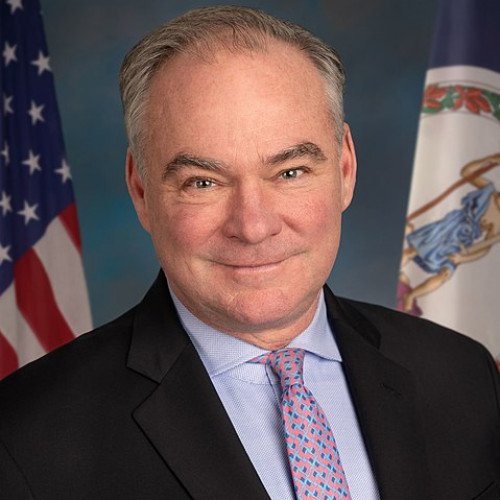Bill Clinton VS Tim Kaine

Bill Clinton
William Jefferson Clinton (né Blythe III; born August 19, 1946) is an American lawyer and politician who served as the 42nd president of the United States from 1993 to 2001. Prior to his presidency, he served as governor of Arkansas (1979–1981 and 1983–1992) and as attorney general of Arkansas (1977–1979). A member of the Democratic Party, Clinton was known as a New Democrat, and many of his policies reflected a centrist "Third Way" political philosophy. He is the husband of former secretary of state, former U.S. senator, and two-time candidate for president Hillary Clinton. Clinton was born and raised in Arkansas and attended Georgetown University, University College, Oxford, and Yale Law School. He met Hillary Rodham at Yale and they were married in 1975. After graduating from law school, Clinton returned to Arkansas and won election as state attorney general, followed by two non-consecutive terms as Arkansas governor. As governor, he overhauled the state's education system and served as chairman of the National Governors Association. Clinton was elected president in 1992, defeating incumbent Republican President George H. W. Bush. At age 46, he became the third-youngest president in history. Clinton presided over the longest period of peacetime economic expansion in American history. He signed into law the North American Free Trade Agreement (NAFTA) and the Violent Crime Control and Law Enforcement Act, but failed to pass his plan for national health care reform. In the 1994 elections, the Republican Party won unified control of Congress for the first time in 40 years. In 1996, Clinton became the first Democrat since Franklin D. Roosevelt to be elected to a second full term. He passed welfare reform and the State Children's Health Insurance Program, as well as financial deregulation measures. He also appointed Ruth Bader Ginsburg and Stephen Breyer to the U.S. Supreme Court. During the last three years of Clinton's presidency, the Congressional Budget Office reported a budget surplus—the first such surplus since 1969. In foreign policy, Clinton ordered U.S. military intervention in the Bosnian and Kosovo wars, signed the Dayton Peace agreement, signed the Iraq Liberation Act in opposition to Saddam Hussein, participated in the Oslo I Accord and Camp David Summit to advance the Israeli–Palestinian peace process, and assisted the Northern Ireland peace process. In 1998, Clinton was impeached by the House of Representatives, becoming the second U.S. president to be impeached, after Andrew Johnson. The impeachment was based on accusations that Clinton committed perjury and obstruction of justice for the purpose of concealing his affair with Monica Lewinsky, a 22-year-old White House intern. He was acquitted by the Senate and completed his second term in office. Clinton left office with the highest end-of-office approval rating of any U.S. president since World War II, and his presidency has been ranked among the upper tier in historical rankings of U.S. presidents, however he has also been subject to substantial criticism for his sex scandals and lies, especially in the wake of the MeToo movement. Since leaving office, he has been involved in public speaking and humanitarian work. He created the Clinton Foundation to address international causes such as the prevention of AIDS and global warming. In 2004, Clinton published his autobiography, My Life. In 2009, he was named the United Nations Special Envoy to Haiti and after the 2010 Haiti earthquake, he teamed up with George W. Bush to form the Clinton Bush Haiti Fund. In addition, he secured the release of two American journalists imprisoned by North Korea, visiting the capital Pyongyang in 2009 and negotiating their release with then-North Korean leader Kim Jong-il. He has remained active in Democratic Party politics, campaigning for his wife Hillary's presidential campaigns in the 2008 and 2016 presidential elections.
Statistics for this Xoptio

Tim Kaine
Timothy Michael Kaine (, born February 26, 1958) is an American lawyer and politician serving as the junior United States senator from Virginia since 2013. A member of the Democratic Party, he previously served as the 38th lieutenant governor of Virginia from 2002 to 2006 and 70th governor of Virginia from 2006 to 2010. Kaine was the Democratic nominee for Vice President of the United States in the 2016 election as the running mate of Hillary Clinton. Born in Saint Paul, Minnesota, Kaine grew up in Overland Park, Kansas, graduated from the University of Missouri in Columbia, Missouri and earned a Juris Doctor degree from Harvard Law School before entering private practice and becoming a lecturer at the University of Richmond School of Law. He was first elected to public office in 1994, when he won a seat on the Richmond City Council. He was then elected Mayor of Richmond in 1998 and was in that position until being elected Lieutenant Governor of Virginia in 2001. Kaine was elected Governor of Virginia in 2005 and was in that office from 2006 to 2010. He was chairman of the Democratic National Committee from 2009 to 2011. Kaine joined the race for the 2012 Virginia Senate Race, and won the election. On July 22, 2016, Hillary Clinton introduced Kaine as her vice presidential running mate. The 2016 Democratic National Convention nominated him on July 27. Despite winning a plurality of the national popular vote, the Clinton–Kaine ticket lost the Electoral College, and thus the election, to the Republican ticket of Donald Trump and Mike Pence on November 8, 2016. Kaine successfully sought re-election to a second Senate term in 2018, defeating Republican Corey Stewart by a larger margin than expected.